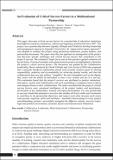| dc.identifier.citation | Barifaijo, M. K., Nkata, J. L., & Seppo, H. (2019). An Evaluation of Critical Success Factors in a Multinational Partnership. Ugandan Journal of Management and Public Policy Studies, 17(1), 98-109. | en_US |
| dc.description.abstract | This paper discusses critical success factors in a partnership of educational institutions from different countries, institutions, cultures, and regulatory frameworks since 2007. The project was a partnership between Uganda, Ethiopia, and Finland to develop leadership and management capacity in Ugandan Universities. An “appreciative inquiry approach” was adopted to evaluate the project using partnering institutions, project leaders, and partnership documents. The paper describes the approach to the management of the project and discusses specific challenges and critical success factors that contributed to the project’s success. The evaluators’ major focus was on how partners gained consensus on key decisions. Practical examples and outputs from the project are highlighted to illustrate the project’s critical success factors. The discussion was guided by the Collaborative Leadership Theory advanced by David Chrislip and Carl Larson (1994) who proposed that a mutually beneficial relationship should work towards common goals by sharing responsibility, authority and accountability for achieving desired results, and that the collaboration does not only achieve “tangibles” but also intangibles such as the dignity that comes with the ability of individuals to start a new venture and see it to success. This evaluation found that the project’s success was attributed to partner institutions’
innovation, caution and collaboration with each assembling a competent team to detect and mitigate threats to their collaboration. The study concluded that the project’s critical success factors were; emotional intelligence of the project leaders and participants, involvement of key stakeholders, honesty and equal participation. For any partnership to succeed, leadership demands a structure that enables all levels within each institution to contribute to the partnership objectives, and respect each other, because each comes with peculiar expertise, skills and attributes. Inevitable shortcomings in every project notwithstanding, partners successfully navigated the different cultures, security issues, legal and political environment, economic factors and infrastructure limitations. | en_US |

